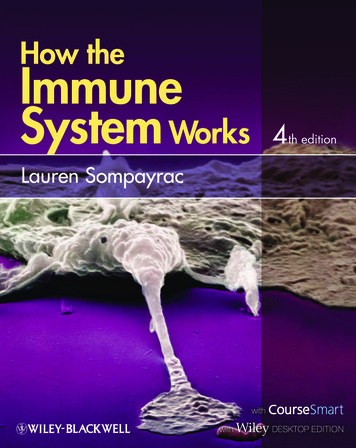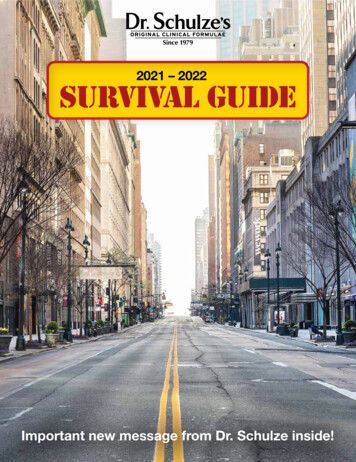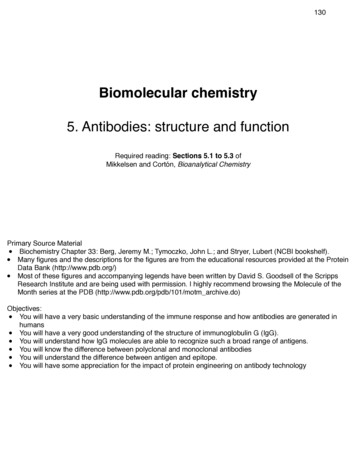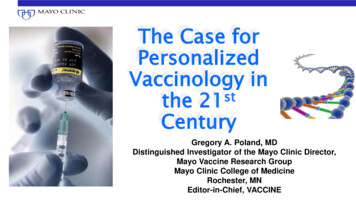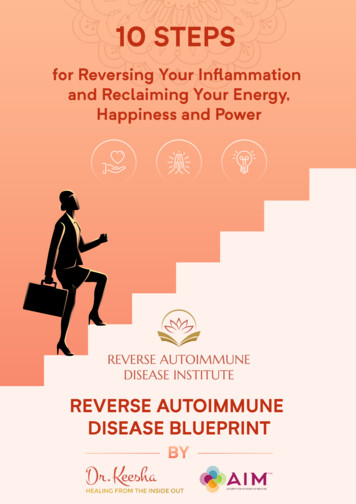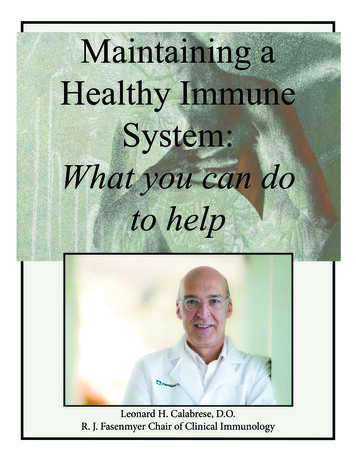
Transcription
Maintaining aHealthy ImmuneSystem:What you can doto helpLeonard H. Calabrese, D.O.R. J. Fasenmyer Chair of Clinical Immunology
2
Table of ContentsAbout the Author 5A personal note from Dr Calabrese 5The Immune System from 30,000 Feet 7The Immune System: The Basics 9Aging and Immunity: ‘Inflammaging’ 10A Training Program for Immune Health 11Diet, Nutrition and Immunity 12Steps to Relief: an Anti-Inflammatory Diet 16Your Immune System needs to get its Zzz's 18Exercise 21Stress Management 23What A Change in Perspective Can Do for You 26Infection Protection 28References 30Additional Reading 30Resources 313
4
About the AuthorDr Len Calabrese is a Professor of Medicine at the Cleveland Clinic Lerner College of Medicine and the director of the R J Fasenmyer Center for Clinical Immunology He has been practicing clinical immunologyand engaging in research and education at the Cleveland Clinic for over 35 years He is the author of over300 manuscripts, chapters and editorials on the subject of clinical immunology A personal note from Dr. Calabrese“I created the first version of this monograph on immune health over 15 years ago and have updated it several times. It is not comprehensive, but more of a bottom line on what you can do totune and maintain your own immune system. There is no way, in the context of such a booklet, toprovide all or even most of the evidence in this field and in many areas, the evidence is inconclusive. Unfortunately for you and me, we still need to make choices about our lifestyle even when wedon’t know all there is to know about everything that affects the immune system; all we can do ismake our choices based on the best information available. This latest version is a bit more personal, although I have left in the scientific background and a number of key references and resources(including the wonderful programs offered by the Cleveland Clinic Wellness Institute). I have stilltried to word it in a way that would be similar to how I would talk to a patient if we were chattingin my office. The 2017 version includes tips from two local experts in the fields of nutrition andyoga - enjoy! Lastly, this version remains more comprehensive than previous versions in that Ireveal how I make my own choices in trying to achieve optimal immune health. I hope you readand enjoy this monograph. Let me know what you think.” Dr Len Calabrese, August, 20175
Elizabeth Kirchner, CNPBetsy is a Nurse Practioner in the Department of Rheumatic and Immunologic Diseases at Cleveland Clinic, and she is the Director of Patient Care for the R J FasenmyerCenter for Clinical Immunology Betsy graduated summa cum laude with a Bachelor’s degree in English Literature andMedieval Studies from Ohio Wesleyan University in 1992 She received her Master ofScience in Nursing from the Frances Payne Bolton School of Nursing at Case WesternReserve University in 2000. She received Board Certification in Rheumatology Nursing in 2016 Betsy is passionate about patient education and is the Education Chair of the Board ofDirectors of the Rheumatology Nurses Society She is also very active in outcomesmeasurements for the department and has spearheaded quality measures that ensurepatient safety such as screening for latent infections and maximizing vaccine use in avulnerable patient population 6
The Immune System from 30,000 FeetYour body’s immune system is a remarkable machine designed to protect you from harmful threatswhich may arise from outside or inside your own body While it was always assumed that our immunesystem is there to protect us from infection, we eventually realized that we are living in a sea of microbes in our gut, our skin, our mouths and nose -- but our immune system is not angry with them andseems to accept these foreigners quite well So for many years immunologists wondered and hypothesized about why we even have an immune system In the mid-1990s, an immunologist named PollyMatzinger put forth the ‘danger model hypothesis’ which proposed that our body’s immune system isreally designed to ward off danger from harmful infections, the environment (i e too much sun, pollution, tobacco, allergens, etc ) and our own internal waste, both at the microscopic and macroscopic levels If this is true, then clearly the most important external threat - as far as the immune system is concerned - is the threat from dangerous infectious agents including viruses, bacteria, fungi and parasites The immune system also serves a role in providing surveillance for internal threats such as protectingus from the development of cancer The immune response accomplishes these vital functions throughits amazing ability to scan and determine when something foreign poses a clear and present danger tous. Thus, it is continuously monitoring our body for evidence of structures known as ‘immunogens,’which represent not only foreignness or non-self, but also contain an element of danger Collectively,a healthy immune system is essential for normal growth and development and maximized longevity Like all other physiologic systems, it is designed to peak in our reproductive years and then decline.When our immune system fails it can have a variety of adverse consequences, including a compromised ability to defend us from infections At the mild end of this spectrum may be an increasedfrequency of viral-like infections that, while not life-threatening, may seriously reduce one’s qualityof life More severe degrees of immune dysfunction may result in unusual complications or failure torecover from infections in a timely manner At the farthest extreme of immune failure, as experiencedby those with advanced HIV disease, the body is attacked by organisms not usually capable of causingdisease in healthy individuals; the resulting infections are known as ‘opportunistic infections’ sincethey exploit a failing immune defense network. Failure of immune surveillance may also lead to anincreased rate of certain cancers such as lymphomas and other types of tumors that thrive in an immunosuppressed milieu In contrast to what can happen when our immune system is under active, another type of failure of ourimmune system is over-activity or immune dysregulation This over-activity can lead to the development of autoimmune diseases These disorders are characterized by hyperactive immune responses thatcannot clearly differentiate self from non-self Examples of these types of disorders include rheumatoidarthritis, connective tissue disease (e.g. systemic lupus erythematosis, vasculitis, Sjogren’ssyndrome), multiple sclerosis, autoimmune endocrine diseases (e g autoimmune thyroid disorders,Type 1 diabetes), inflammatory bowel disease, celiac disease, inflammatory lung disease, and a varietyof poorly understood diseases including chronic fatigue syndrome and related disorders 7
Understanding why our immune system malfunctions is difficult,but research has revealed the remarkable intricacies of the immunesystem, including how it relates to other vital bodily functions. Thinkabout your immune system not as an isolated organ, but a highly integrated system of cellular responses intimately related to other physiologic systems For example, there is abundant evidence that immuneresponsiveness is practically hard-wired to our central nervous systems through a variety of neurochemical pathways Understandingthis relationship is critical to appreciating that maintaining neuropsychological health in the form of minimizing stress and maintaininggood sleep hygiene is vital for optimal immune health Additionally,cardiovascular health is also tied to the immune system in a varietyof ways The mere ability of our circulatory system to move or ‘traffic’ immune competent cells to points of conflict is evidence of such.Similarly, the immune system is represented in virtually every otherorgan system, including gastrointestinal, pulmonary, endocrine anddermatologic, providing ample evidence of why immune health iscritical to overall health 8Checkpoint Therapy:An Immunology BreakthroughA truly remarkable recent advancehas been made in the field ofoncology, where the immune systemis being harnessed to fight cancerwith a new class of medicines called“checkpoint inhibitors.” These drugshave revolutionized the treatment ofcertain cancers; they work by takingthe brake off the body’s immunesystem, leading to aggressive antitumor effects with minimal collateraldamage Being able to see whathappens to the immune system fromthis perspective will undoubtedlylead to important insights intoautoimmune diseases We are farcloser to the beginning than theend of this remarkable story so staytuned!
The Immune System: The BasicsThe human immune system is a remarkable product of evolution that has spanned hundreds of millions ofyears. Some of the same molecules found in one-celled organisms that existed when life was first found onour planet are represented in our immune system Over millennia, the human immune system evolved, adding additional layers of defenses to eventually display what immunologists call ‘immunologic redundancy.’This feature provides additional layers of protection or back-up in the event that one of our critical defensesystems fails Visualize your immune system as a group of separate but highly integrated defense networks — each servinga particular role but all cooperating with each other The armamentarium consists of a variety of differentcell types and hundreds and hundreds of proteins, each of which provides a specific function. The immuneresponse is divided into the innate and adaptive immune responses Our innate immune system is the olderof the two, being found in our most primitive ancestors. This is one of our first lines of defense from bothexternal and internal attack. Critical members of the innate immune system include cells known as ‘naturalkillers’ named for their ability to seek and destroy a wide range of foreign cells including those arising frominfection or malignancy. Other cells, known as dendritic cells and macrophages, also participate in earlyimmunologic defense All cells of the immune system are capable of communicating with each other throughdirect cell contact and/or the production of cellular messengers know as cytokines, capable of inducing orsuppressing inflammation. A complex system of proteins known as the ‘complement system’ also providesa layer of defense. Following triggering of the innate immune response, the adaptive response takes over.This is a more refined or specific system of defense, designed to seek out and destroy infections, toxins andtumors without causing harm to the host. B-cells produce specific proteins known as antibodies, which circulate and bind to specific targets similar to how a heat-seeking missile seeks and destroys a hot target whileleaving the cold surrounding environment undamaged Finally, the T-cells serve as the command and controlcenter for this integrated response, providing not only defense against the most stealthy of invaders but alsoproviding signals to end the battle before harm is done to the host This ability to shut down in a timely manner is a vitally important characteristic of our immune systems Overall, the immune system serves to generate an ‘inflammatory response’ that can be localized (e.g. a boil)or generalized (e g fever, elevated pulse) and serves as the basic mechanism for protecting and ridding us offoreign invaders. In the past few years, much has been said of the negative effects of inflammation includingeverything from premature cardiovascular disease, premature neurocognitive decline and in general premature aging We now have clinical measurements of this phenomenon such as high sensitivity CRP, which caninform us of some of these risks, at least in terms of vascular disease. Inflammation increases with disorderssuch as obesity, diabetes and autoimmunity and is made worse by a sedentary life style In the past few years, one of the newest horizons in immune research is the recognition that our own gastrointestinal system harbors the richest repository of immunologic weapons in the entire body This system isnow referred to as ‘the microbiome,’ the totality of micro-organisms that live in harmony with us. In fact, themajority of cells in our body are not of human origin if we count the microbes we carry around! I will returnto the significance of this when we discuss nutrition and immunity. Clearly in such a complex system, sohighly regulated and intricately constructed, there is ample room for things to go wrong 9
Aging and Immunity: ‘Inflammaging’‘Inflammaging’: When your immunologic clock runs out, you’re dead!Immune dysfunction arises from a variety of factors, many of which are out of our direct control In particular our immune system, like other bodily systems, runs down over time. This phenomenon is known asimmune senescence and is believed to be responsible for the increasing incidence of infections, cancers anddiseases of the immune system we face as we age The reasons for immunosenescence are unclear but think about it: if we view our lives in evolutionary terms,nature really only wants us to live long enough to reproduce! Maybe 18-25 years! Yes, that may seem disappointing but it is probably close to reality Life extension does very little for our species, so much of our“equipment” (i.e. heart lungs, brain and immune system) just wears out.A lot of work over the past few years has implicated several additional factors contributing to the runningdown of our immunologic clock. I will mention two: inflammation, leading to the coining of one of myfavorite words (“inflammaging”), which clearly implies that inflammation is bad for a long-lived and healthyimmune system; and infections - particularly certain forms of viral infections such as CMV - against whichour immune systems must work harder and harder over time to defend us. This is a tough problem without asimple solution at the moment Fortunately our immune system, like other bodily systems, can be protected and enhanced through a carefulapplication of training principles that I will outline for you in the following pages Adopting these habits willneither guarantee perfect health nor protect us from the inevitability that we are all growing older; however,we will be enriched by knowing we are doing everything we can do to optimize our immune response, delayimmune senescence and fight immune-based diseases. The principles espoused in this monograph are basedon the best possible external evidence derived from research in peer-reviewed publications as well as theexperience of 35 years of practicing clinical immunology 10
A Training Program for Immune HealthUnfortunately, and despite what you may be exposed to or enticed by, there is no medication or supplementcapable of optimizing the immune system There are, however, techniques, supported by experimentalevidence, capable of boosting our immune systems, resulting in improved health and improved qualityof life These techniques largely fall into three areas: exercise/training and immunity, diet/nutrition andimmunity, and mental/spiritual health and immunity I will discuss each technique in detail; but before I do,I want to reinforce that no system of training for the immune system or any other physiologic system cansupersede an unhealthy lifestyle. Thus, I am taking as a given that as part of your training regimen you willask yourself a few simple questions in anticipation of improved immunologic health: Do you smoke?If so, quit now. Smoking is the single greatest avoidable negative influence on immune health.If you need to be provided with scientific rationale for this you are not ready to begin training.Stop now or get help doing so How much alcohol do you drink?While some alcohol is thought to be beneficial, avoid excess alcohol and all drugs capable ofcompromising health in general What are your environmental risks?Avoid carcinogens including excessive sun exposure and other environmental factors that can beavoided Are you significantly overweight?There are now abundant data to suggest that being significantly overweight contributes toincreased inflammation and compromise of the immune system. We will discuss approaches tothis later, but remember it’s important!Having done these simple but important assessments, you are now ready to commence training your ownimmune system and achieving optimal immunologic health 11
Diet, Nutrition and ImmunityThere is no doubt that diet influences general health and immune health, but I can tell you clearly that thereis no prescription to “boost” your immune system to supernormal levels. I knowSuggested Reading:there is a lot of hype out there and there are many people willing to tell you — and For a high sciencemore willing to sell you — easy fixes that offer better immune health and enhanced(very high science)protection from diseases. If there were an easy fix, I would be selling it too! On theread: “Dietary Influother hand, there are clear data to support the connection between a ‘healthy diet’ences on IntestinalImmunity” by Veldand better overall health Our genes are encoded to meet the challenges of a diet thathoen and colleagueswe no longer eat We now favor a diet with increasing amounts of meat, which is(Nature Reviews:high in energy but also high in fat compared with agriculturally-based diets MoreImmunology Vol 12,over, the past two centuries have seen the rise of the “Western” post-industrial dietp696-708, 2012).with increasing amounts of refined carbohydrates and foods that are nutritionally For a great read thatsummarizes the imdepleted -- both through genetic drift and the fact that they need to travel many milesportant facts of nutri- to our tables The past two centuries have also introduced dramatic ecologic andtion and eating read:environmental changes that we are less than fully equipped to deal with So just whatIn Defense of Foodis a healthy diet? Is it to go vegan? Eliminate gluten? Eat fish? Take mega-vitaminsby Michael Pollan.and anti-oxidants? I have studied this topic over the years and I will share with younot only my interpretation of available research but also my own personal beliefs andpractices. A strong case has been made by researchers that diet influences our immune health at the level ofour intestines -- and remember, there are more immune cells and antibodies in the gut than in all of our othertissues combined!Practical Tips on Diet and Immune Health: MY RecommendationsFirst of all, there is nothing that you cannot eat! It is all a matter of moderation and balance My recommendations for healthy eating and immunity are largely based around the advantages of what iscommonly referred to as the Mediterranean Diet. There is copious evidence in the scientific literature supporting the merits of this type of diet in such diverse areas as cardiovascular health, brain health and musculoskeletal health. The essential elements of this diet are listed below: 12Minimally processed, seasonally fresh, and locally grown foodsOlive oil as the principal source of dietary lipidsAbundant plant foods (fruits, vegetables, beans, nuts, seeds)Dairy products (mainly cheese and yogurt) consumed in low to moderate amountsFewer than four eggs consumed per weekRed meat consumed in low frequency and amountsWine consumed in low to moderate amounts, generally with meals
Why this diet and why not a vegan diet, or even going to a more extreme no-fat diet? While there is ampleevidence that a vegan diet is healthful, there are no data to demonstrate it is healthier than a diet with limited meat intake. A study in 2013 demonstrated that vegans as well as pseudo-vegetarians (fish and veggies)and “semi-vegetarians” (or what Michael Pollan calls “flexitarians”) all experienced reduced all-causemortality1. As for the virtues of the Mediterranean Diet, there are extensive scientific studies supporting thehealthful effects of this diet including beneficial effects on cardiovascular health. There are also intriguingeffects with less data behind them but still very compelling, on prevention of other health problems including hypertension, diabetes, obesity, infectious diseases and a number of ‘age related’ physiologic systems2 This type of diet has also formed the basis of the Cleveland Clinic’s Lifestyle 180 Program which has beenused successfully to induce meaningful improvements in biometric and laboratory outcomes seen in a number of chronicdiseases3 Collectively, there is ample evidence to encourageyou to get on board with the Mediterranean Diet If, on theother hand, you want to go vegan or nonfat that’s all right too!Each of these diets moves us away from the problems associated with the Western industrialized diet which is rich in meatand refined sugars and lacking in healthful elements we havedescribed already Evaluate Your DietNOW, ask yourself a series of questions:1.Are you harming yourself with your diet?Examine your diet If it is rich (meaning you have frequent portions of such) in lots of processed foods,meat, added fat, sugar and refined grains (i.e. white bread) start cutting down on these things today! Ifyou are a real carnivore, start with meatless Monday and go from there Ultimately, set a goal of eatingmeat as a side dish rather than a main course - and do so only a few times per week.2.Are you missing something important in your diet?A lack of vitamins (see question 6), phytochemicals (chemical compounds occurring naturally in plantsand depleted in processed foods), unsaturated fats and food known to trigger something called the arylhydrocarbon receptor (AhR) in our intestines can lead to impaired intestinal immunity and inflammation, and can be harmful to our health4. Seeking the right balance by not only avoiding bad things, butadding good things, is possible with a Mediterranean-type diet 3.Are you eating more processed than fresh foods?I am sure if you live in America the answer could easily be “yes.” Mr. Pollan advises us not to eatanything that qualifies as “processed concoctions” no matter how healthful the label says it is; in fact,he warns us away from anything in a box or can that has to advertise itself as “healthy”! This applies tovirtually everything advertised on TV. Eat real food, you know, the stuff your grandmother would recognize. Frequent farmers markets or purveyors that work at getting fresh food from nearby.4.Do you stuff yourself?We all do from time to time, but this can be bad for you and it can be changed A lesson on this comesfrom another great book I have read, enjoyed and have learned a lot from, called The Blue Zones byDan Buettner. This book studies and describes those populations around the world that are the mostlong-lived (i.e. centenarians). You know what I learned? First, in none of these areas do people takevitamins or deliberately exercise but they are all physically active and eat ‘healthy.’ Second, there was13
no common diet, but most would fit closely to the Mediterranean Diet. Third, and most importantly, acommon trait was to not eat until you are full but to stop a little early. In Japan on Okinawa they sayhara hachi bu or “Eat until you are 8/10s full.” I am really trying on this one.5.Do you make poor snack choices routinely or eat desserts?Snack on good things, like fruits and nuts, and eat treats only when you are really treating yourself. Youare not obliged to – nor should you – eat dessert every day!6.What about vitamins and supplements?Over the years I have changed my mind on this question. I would first ask if you are at risk for any tracenutrient deficiency. Marginal deficiencies are not uncommon in people who do not consciously crafttheir diets. If you are vegan, you are at risk for B12 deficiency and perhaps iron as well, unless youare careful If you avoid dairy, you may not get adequate calcium and if you come from an area of thecountry like the Great Lakes area, you may be at risk for Vitamin D deficiency (from lack of exposureto sunshine). For bone health, maintaining an adequate intake of calcium is essential (1000-2000 mg perday for adult women and 1000 mg per day for adult men). Low vitamin D has been linked with manyhealth-related issues and trace deficiency states are very common. For example, low levels of VitaminD have been linked with increased susceptibility to a number of infections. There have been severalinterventional trials demonstrating the variable effectiveness of modest doses of Vitamin D, includingone demonstrating the effectiveness of 4000 units per day to reduce the frequency of respiratory infections5 The recommendations from public health and medical societies in the US and Canada are all overthe map but are in the range of 600 IU per day to 2000 IU per day. Since I live in the Great Lakes area,I take 2000 units per day of Vitamin D, which is in excess of the Institute of Medicine recommendeddaily allowance Other than my concerns regarding calcium and vitamin D, I have no strong recommendations on other supplements Anti-inflammatory DietThere is clear evidence from both animal and human studies that diet can modify the inflammatory responseand, in turn, can lead to beneficial anti-inflammatory activity naturally. While the degree of this effect ismodest it may be clinically beneficial to certain individuals. The benefits of reducing inflammation aremany and may extend to reducing arthritic symptoms as well as reducing the risks of vascular as well asother degenerative diseases. Finally, there is increasing data that inflammation is a central link in aging;reducing inflammation may reduce or slow some of these associated changes. TheSuggested Reading:basic principles are a) reducing the content of meat and dairy as they contain proinflammatory fats (saturated, trans and partially hydrogenated oils) and b) increaseFor more details onhealthy eating includingsources of Omega -3 fatty acids in the diet which include flax seeds, cold water fishmore detailed information (salmon, herring, sardines and bluefish) and fish oil supplements (1-2 grams peron this diet and otherday) lifestyle tips, go tothe Cleveland ClinicWellness website http://my clevelandclinic org/wellness/default aspx14Taking a supplement of Omega 3 is an option, but there are some side effects (particularly dyspepsia) associated with some forms and concerns that some brands offish oil may contain excessive or unwanted elements such as mercury. If you aregoing to take one, seek a quality brand. All of this is taken care of naturally, however, if you move steadily toward the Mediterranean Diet
In terms of a practical list of things to do with your diet and nutrition, try the following: Move to the Mediterranean Diet. I try to accomplish this in a VB6 fashion as outlined in the box, right,courtesy of Mark Bittman.Note: If you do this, the rest of these tips come easily, if notautomatically! Try to eliminate red meat from your diet or, if necessary,eat it no more than once every ten days Also eliminate orreduce your intake of fried meats. Try to replace the meatsin your diet with servings of fish, particularly oily fish suchas salmon. Salmon contains a rich form of oil known asomega-3 fatty acids which has natural anti-inflammatoryproperties Use only olive oil in your cooking to reduce use of fats.Olive oil is rich in mono-saturated fats All other oils, withthe possible exception of canola oil, have unfavorabletypes of fats for the immune system Avoid excessive useof margarine Though most margarines are unsaturated intheir fat content they are artificially prepared and the longterm consequences are really unknown. Try to minimizethe use of all fats, but wherever possible use olive oil incooking and for dressing salads.Vegetarian before 6PM? Worth a Try!Mark Bittman is one of the finest food writers inAmerica. His editorial columns in the New YorkTimes on food and society have been truly enlightening.
6 7 The Immune System from 30,000 Feet Your body's immune system is a remarkable machine designed to protect you from harmful threats which may arise from outside or inside your own body While it was always assumed that our immune
